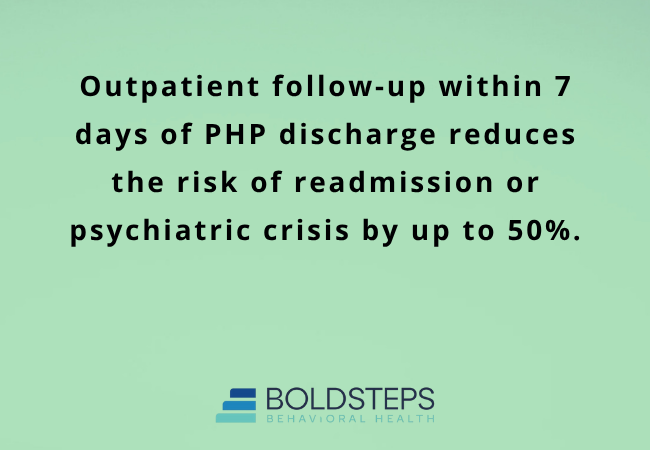Successfully completing a Partial Hospitalization Program (PHP) is a significant milestone in recovery from mental health issues, substance use disorders, or both. But what comes next is just as critical. For Concord residents, transitioning from PHP to outpatient care means stepping into more independence—while still maintaining access to therapy, medication, and support.
At Bold Steps NH, we guide every client through this pivotal phase with compassion, structure, and individualized care plans. Our goal is to help you continue healing while reintegrating into work, school, family life, and the community.
Understanding the Levels of Care After PHP
Recovery isn’t a straight line—it’s a stepwise journey. After completing PHP, you typically move into less intensive forms of care designed to provide continued support while granting more flexibility.
Partial Hospitalization Program in New Hampshire (PHP)
- 5 days/week, 4–6 hours/day
- Highly structured for individuals needing daily support
- Focused on stabilization and foundational skills
Intensive Outpatient Program in New Hampshire (IOP)
- 3–5 days/week, 3 hours/day
- Offers a strong therapy framework with more personal freedom
- Ideal next step after PHP
Outpatient Treatment Program in New Hampshire
- 1–3 therapy sessions per week
- Designed for long-term recovery, ongoing therapy, or relapse prevention
- Supports real-world reintegration with clinical backup
These levels are all part of our integrated Addiction Treatment Program in New Hampshire and Mental Health Treatment Programs in New Hampshire.
The Emotional Impact of Stepping Down
Leaving the safety net of PHP can be both exciting and overwhelming. Common emotions include:
- Anxiety about less structure or increased responsibility
- Fear of relapse or regression
- Pride in progress made
- Uncertainty about what lies ahead
At Bold Steps NH, we address these feelings directly by creating personalized step-down plans and offering continuous emotional support.
Redefining Structure—Building a New Routine
Structure is critical to recovery. During PHP, much of your schedule is defined. In outpatient care, you begin to build your own. This involves:
- Setting regular sleep, meal, and self-care routines
- Scheduling therapy, support group, and medication appointments
- Managing work, education, or parenting responsibilities
- Planning time for rest, hobbies, and meaningful connection
Our case managers help clients create realistic weekly schedules that balance freedom and accountability.
Why Gradual Transitions Matter in Recovery
Jumping from high-intensity treatment to full independence often leads to setbacks. Gradual transitions, like stepping down to IOP or outpatient therapy, help you:
- Practice coping skills in real-world settings
- Maintain access to therapy, medication, and peer support
- Strengthen relapse prevention strategies
- Rebuild routines without losing professional guidance
Our Behavioral Health Treatment Center in New Hampshire supports you through each level—no matter how long you need.
Key Steps in Transitioning from PHP to Outpatient Care
1. Clinical Review and Discharge Planning
Your care team evaluates your emotional, behavioral, and physical progress to decide when you’re ready to transition. This includes:
- Psychiatric evaluations
- Therapy progress reports
- Risk and safety assessments
A formal discharge plan will outline your next level of care and support needs.
2. Warm Handoff to New Providers
We coordinate directly with outpatient therapists, psychiatrists, or group facilitators to ensure a seamless continuation of services.
3. Personalized Outpatient Schedule
Depending on your goals, your plan may include:
- Individual therapy 1–2x per week
- Group sessions 2–3x per week (IOP)
- Medication management check-ins
- Case management or recovery coaching
The Role of Peer Support and Alumni Groups
Peer support can be incredibly grounding during transitions. At Bold Steps NH, we offer:
- Access to alumni support groups
- Connections with recovery mentors
- Community events and wellness workshops
Engaging with people who understand your journey can reduce isolation, boost accountability, and remind you that you’re not alone.
Continuing Therapy and Medication Management
Outpatient care allows you to apply real-world experiences to therapy in real time. At Bold Steps NH, you’ll continue to receive:
- Cognitive Behavioral Therapy (CBT) for mood disorders and thought patterns
- Dialectical Behavior Therapy (DBT) for emotional regulation
- Relapse prevention counseling
- Psychiatric oversight for medication adherence and side effect monitoring
These therapies support continued healing for conditions like:
- Anxiety Disorders
- Depression
- Bipolar Disorder
- Substance Use Disorders
- Dual Diagnosis cases
Family Involvement and Support in the Transition
The transition out of PHP is also a time to strengthen family systems. We provide:
- Family therapy sessions
- Education on triggers, boundaries, and communication
- Resources for loved ones to understand and support recovery
When families are informed and involved, clients feel more supported and empowered.
Common Challenges During Transition—and How to Handle Them
| Challenge | Solution |
|---|---|
| Less structure | Use schedules, alarms, and planners to stay on track |
| Social pressure | Practice boundary-setting and role-playing in therapy |
| Emotional swings | Identify triggers and safety plans with your therapist |
| Cravings or urges | Lean into coping tools and peer support immediately |
Our Intensive Outpatient Program in New Hampshire provides ongoing access to help during these vulnerable moments.
Using Outpatient Care to Rebuild Purpose
Beyond stabilization, outpatient care helps you rediscover what brings you meaning. We help clients:
- Set personal and professional goals
- Identify hobbies, talents, or passions
- Create a roadmap for education, employment, or volunteerism
- Build confidence in social, work, and family roles
This phase of recovery is about more than staying sober or stable—it’s about building a fulfilling life.
Life After PHP: Reclaiming Your Independence
Every success, no matter how small, becomes part of your recovery story. Life after PHP can include:
- Returning to work or starting school
- Reconnecting with healthy friendships
- Attending therapy and support groups by choice—not just structure
- Feeling emotions and managing them without substances or crisis
Outpatient care gives you the space to grow while ensuring you have a support system when things feel uncertain.
Outpatient Programs Available in Concord, NH
As part of our commitment to long-term recovery, Bold Steps NH offers:
- Standard Outpatient Therapy
- Intensive Outpatient Program in New Hampshire (IOP)
- Telehealth and in-person flexibility
- Support for depression, anxiety, PTSD, and substance use
- Ongoing access to psychiatric care and recovery coaching
Our services are customized to your stage of recovery, and we walk with you as long as needed.
Why Choose Bold Steps NH for Your Transition?
Here’s why Concord residents trust us during this critical phase:
- Experienced, licensed clinical team
- Coordinated transitions between PHP, IOP, and outpatient care
- Whole-person approach to mental health and addiction
- Family-inclusive support options
- Flexible scheduling for life reintegration
- Local care that feels personal, not clinical
We don’t just help you “step down”—we help you step forward.
Conclusion
Transitioning from PHP to outpatient care is not a step back—it’s a step forward into greater independence, growth, and real-world healing. At Bold Steps New Hampshire, we empower you with the tools, people, and structure needed to navigate this next chapter.
Whether you’re facing anxiety, depression, addiction, or a combination of challenges, we’re here to support every step of your journey—starting right now. Call 603.915.4223 to learn more and start your personalized step-down care plan today.
FAQ on PHP to Outpatient Care
What is the difference between PHP and outpatient care?
PHP (Partial Hospitalization Program) provides structured, daily therapy, while outpatient care offers flexible support with fewer weekly sessions.
Why is transitioning from PHP to outpatient care important?
Gradually stepping down allows you to apply recovery skills in daily life while maintaining access to therapy, medication, and professional support.
What services continue after PHP?
You’ll still receive individual and group therapy, psychiatric care, medication management, and access to recovery coaching and peer support.
Can I work or attend school during outpatient care?
Yes. Outpatient and IOP programs are designed to be flexible, allowing you to reintegrate into daily responsibilities with ongoing support.
How long does the outpatient phase last after PHP?
It varies based on individual needs. Some may stay in IOP for a few weeks, while others may continue outpatient therapy for months to maintain progress.
What if I feel overwhelmed during the transition?
Bold Steps NH provides relapse prevention planning, peer support, and crisis tools to help you navigate challenges safely and confidently.



